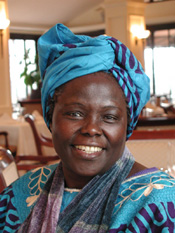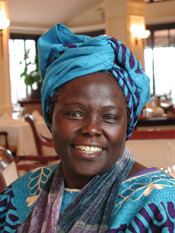
Today is International Women’s Day, and it is the centenery of the event this year, celebrating 100 years’ of progress in the field of women’s rights around the world. There are still many problems that women face, of course, but nobody can deny that there has been progress.
Wangari Maathai is one of the most articulate women alive today, and for nearly 40 years her voice has been heard in support of women and women’s rights, the environment and sustainable development, and peace and reconciliation, both in her homeland Kenya, and in Africa and around the world.
She has many times received recognition of her contributions to these issues and has won many awards, including an honorary doctorate from Connecticut College, the Right Livelihood Award (1984) and the Nobel Peace Prize (2004), amongst many others.
In this talk given at Yale University Wangari talks about the way she got started in environment issues through listening to the poor women whose needs were very basic: food, water and energy (it means firewood in this context).
She goes on to explain the origin of monoculture in the colonial countries, a process that was needed when it started, but which is now largely inappropriate and damaging when there is no longer a counter-balance with a diverse and integrated system of forestry and agriculture.
Having a dream that if people would do their bit by planting trees she started the Green Belt Movement which sought to plant a billion trees – and astonishingly attained its objective within a year! The target is now 13 billion 🙂
The purpose, as she explains it, was not simply about planting trees, but about getting people involved and doing something about the issues that they face, and therefore the whole movement has great political implications also.
Wangari also talks about the devastation that climate change is bringing about, and she quotes Gandhi to the effect that there can be enough for peoples’ needs, but their can never be enough for peoples’ greed.
There is a website for the Green Belt Movement, where you can find out more information about the movement and about the issues it is addressing, as well as much more information about Wangari herself.
You can also go to the United Nations Environment Programme’s Billion Tree Campaign and register the trees you have planted; and you can read more about Wangari’s life and work on the Wikipedia.
if the video does not appear on the page, try reloading the page; and if that doesn’t work, leave a comment so I can update the page (the comment is not published)
